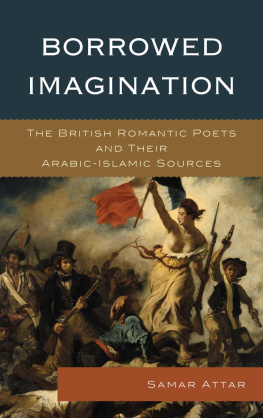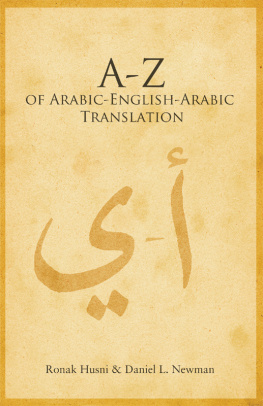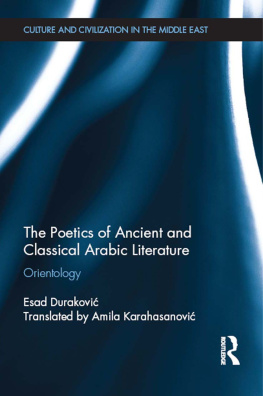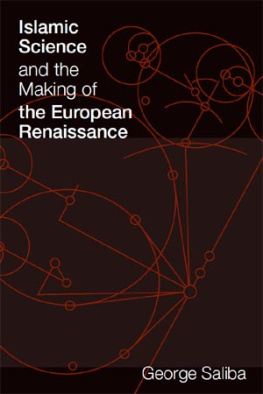Borrowed Imagination
Borrowed Imagination
The British Romantic Poets and Their
ArabicIslamic Sources
Samar Attar
LEXINGTON BOOKS
Lanham Boulder New York Toronto Plymouth, UK
Published by Lexington Books
A wholly owned subsidiary of Rowman & Littlefield
4501 Forbes Boulevard, Suite 200, Lanham, Maryland 20706
www.rowman.com
10 Thornbury Road, Plymouth PL6 7PP, United Kingdom
Copyright 2014 by Lexington Books
All rights reserved. No part of this book may be reproduced in any form or by any electronic or mechanical means, including information storage and retrieval systems, without written permission from the publisher, except by a reviewer who may quote passages in a review.
British Library Cataloguing in Publication Information Available
Library of Congress Cataloging-in-Publication Data
Attar, Samar.
Borrowed Imagination : the British Romantic Poets and Their Arabic-Islamic Sources / Samar Attar.
pages cm
Includes bibliographical references and index.
ISBN 978-0-7391-8761-6 (cloth) -- ISBN 978-0-7391-8762-3 (electronic)
1. English poetry--19th century--History and criticism. 2. English poetry--Arab influences. 3. English poetry--Islamic influences. 4. Romanticism--Great Britain. I. Title.
PR590.A88 2014
821'.709--dc23
2013046484
 TM The paper used in this publication meets the minimum requirements of American National Standard for Information Sciences Permanence of Paper for Printed Library Materials, ANSI/NISO Z39.48-1992.
TM The paper used in this publication meets the minimum requirements of American National Standard for Information Sciences Permanence of Paper for Printed Library Materials, ANSI/NISO Z39.48-1992.
Printed in the United States of America
For Dalhousie University English and Gothic Literature Professor D. P. Varma (d. 1994), and for Harvard University Arabic Literature Professor Muhsin Mahdi (d. 2007), in memoriam.
Wer sich selbst und andere kennt,
wird auch hier erkennen:
Orient und Okzident
Sind nicht mehr zu trennen.
(He who knows himself and others
will also recognize here that
Orient and Occident
are no longer separable).
Johann Wolfgang Goethe, West-ostlicher Diwan, 1819.
Acknowledgments
I am grateful to the anonymous reviewer of my manuscript for his/her assistance and generosity. I do appreciate the time and care he/she took in providing a thoughtful review.
Preface
In April 22-23, 2005, Professor Wolfhart P. Heinrichs of the Department of Near Eastern Languages and Civilizations at Harvard University organized a conference on One Thousand and One Nights in honor of Muhsin Mahdi, James Richard Jewett Emeritus Professor of Arabic at Harvard, celebrating the twentieth anniversary of Mahdis Arabic edition of the Nights, which was published in 1984 and the 300-year history of the book in Europe. At the time I was a Research Fellow at the Center For Middle Eastern Studies at Harvard. Heinrichs invited me to give a paper, and I accepted his invitation although I was very busy working on a different project.
My paper was entitled Borrowed Imagination: Coleridges Ancient Mariner and the Arabian Nights. Students from the English Department came to listen to me at the time. The topic fascinated them. They asked me many questions and assumed that I would be producing an article, or a book of some sort on the debt of Coleridge, or other Romantic poets to the Nights in the near future. Professor James Engell, the chair of the department, read my paper, and encouraged me to publish it. He found it intriguing and informative. But I was busy with two other projects. At the end of June 2006 I had to leave Harvard and the United States, and that meant I would not have enough sources to work with for a big Romantic project. Widener and Houghton libraries would be out of reach for me!
When I was growing up in Damascus, Syria, I have never seen, or read the complete volumes of the Arabian Nights. Of course, as a child I was familiar with tales, such as Sinbad the Sailor, or Aladdin. But neither my family, nor my school had ever introduced me to such a book. The Nights was not part of the canon of Arabic literature. Only in 1966 when Dalhousie University in Canada sent me to Harvard to work on my MA thesis on The Influence of T. S. Eliot upon Salah 'Abd al-Sabur that I discovered the Arabian Nights. The Egyptian poet Abd al-Sabur was attending an international poetry conference at Harvard at the time. I interviewed him and discussed his poetry with him during that summer. He referred to the Nights several times and mentioned specific tales that influenced him a great deal. When I went to read these tales in the dark stacks of the library I was terribly shocked. Only then I realized why the Nights were never part of my education. My family in Damascus owned a huge library. But the Nights were not there to be seen. I must confess I was not happy to read the tale of The Three Ladies from Baghdad as suggested by the Egyptian poet. For me it was sheer pornography. But I had to read his sources in order to understand his poetry.
This was my first encounter with The Nights in both Arabic and the various translations in European languages. And because it was not a pleasant encounter, I revolted against my mentor Professor D. P. Varma who suggested to me in 1967 that I work on the influence of the Nights on the English Romantic poets for my PhD dissertation. I did not wish to touch that book again although I did not mind some of its tales, such as Sinbad the Sailor.
In 1968 I moved to the United States to work on my doctorate in English and Comparative Literature, and chose a topic on The Intruder in Modern Drama in which I could utilize my knowledge of English, French, and German and choose a sociopolitical approach to the study of modern theater. But as a teaching assistant in the English Department I always introduced my students to the Arabic sources of Dante, or the European Romantics among others. One British professor in particular was very unhappy about me stressing the influence of Sinbad the Sailor on Coleridges Ancient Mariner. He was very Eurocentric and could not possibly believe that non-European sources had ever influenced English literature. But my students, most of them were New Yorkers, did enjoy comparing and contrasting old Arabic sources with relatively modern English and European literary texts.
Since the late 1960s I taught in different countries and continents, but never managed to work on the British Romantics and their debt to the Arabian Nights, or other Arabic sources. I was publishing books in different areas. In 1987 my interest in the Nights was suddenly rekindled. I was invited to Cairo by the feminist Dr. Nawal Sa' dawi to an international conference. My paper: The Journey from Barbarism to Civilization and the Necessity of Restraining Female Sexuality: The Examples of Shahrazad and the Box Woman in One Thousand and One Nights stirred a storm in the city. The leading journals and newspapers commented on my paper and attacked me for at least two months. Sa'dawi published my Arabic paper in Cairo in 1988 and in English in 1990. An English version, in collaboration with Gerhard Fischer, appeared in the summer/fall issue of Arab Studies Quarterly in 1991, under the title Promiscuity, Emancipation, Submission: The Civilizing Process and the Establishment of a Female Role Model in the Frame-Story of One Thousand and One Nights. Soon, an Arabic translation followed and appeared in the Egyptian journal Fusul in the winter of 1994. The Spanish scholar Pedro Monferrer Sala translated the article into Spanish and published it in
Next page








 TM The paper used in this publication meets the minimum requirements of American National Standard for Information Sciences Permanence of Paper for Printed Library Materials, ANSI/NISO Z39.48-1992.
TM The paper used in this publication meets the minimum requirements of American National Standard for Information Sciences Permanence of Paper for Printed Library Materials, ANSI/NISO Z39.48-1992.